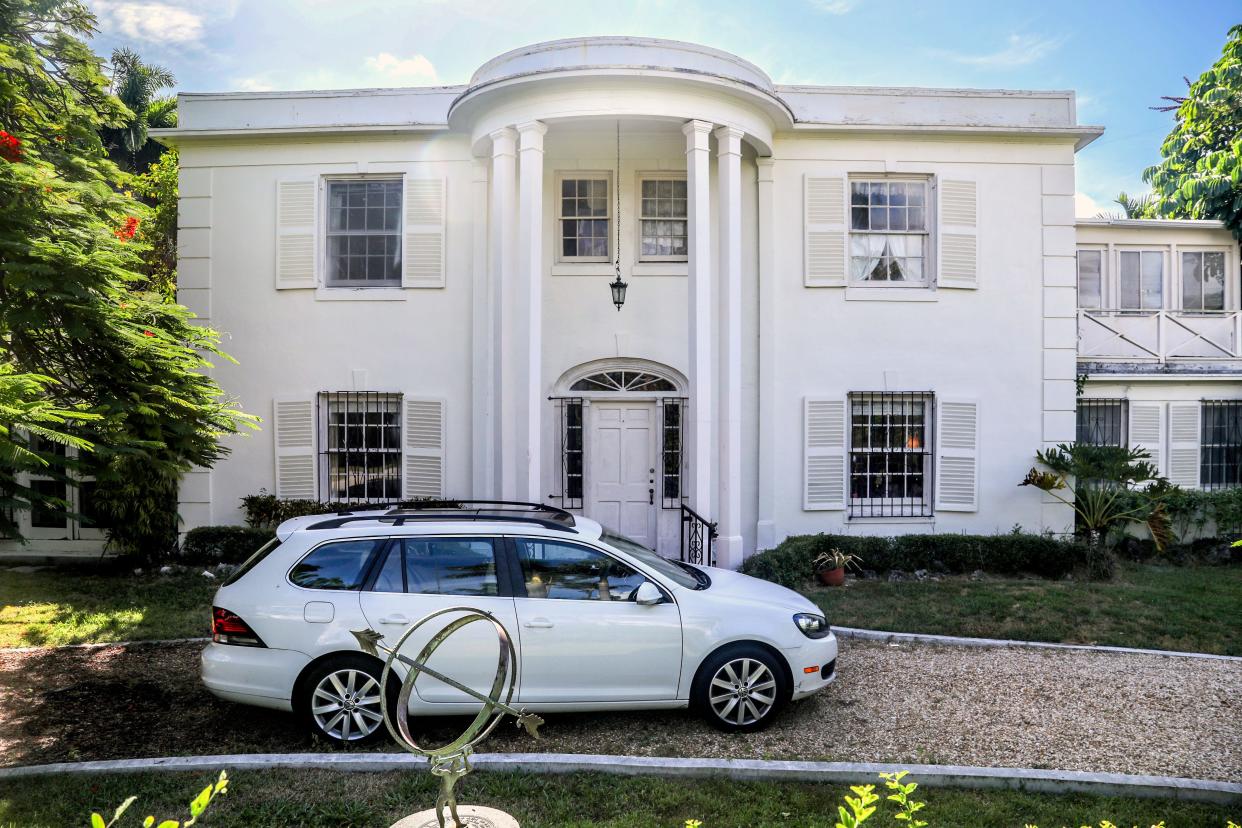Sea change: Florida law lets some Palm Beach owners raze newly designated landmarked houses

- Oops!Something went wrong.Please try again later.
Under a new state law, Palm Beach officials can no longer protect newly landmarked houses from demolition if their owners did not agree to the landmark designation.
The law applies to houses that were landmarked after Jan. 1 of this year in one of three specified flood-hazard areas — and those areas encompass every house on the island, according to Wayne Bergman, the town’s director of planning, zoning and building.
The law was designed to eliminate governmental red tape for homeowners in areas at risk of flooding who want to raze their houses and replace them with versions that meet flood-plain requirements.
The flood-hazard zones mentioned in the legislation are defined by a flood-insurance rate map issued by the Federal Emergency Management Agency. The law targets houses in which the “lowest finished floor elevation” is “at or below base flood elevation,” as defined in the state’s building code or a local ordinance, whichever is higher.
The legislation has created a sea change in how the town has protected historic buildings from demolition since its landmarks preservation ordinance was enacted in the late 1970s.
Recently landmarked in Palm Beach: 16 historic properties designated as landmarks during winter season
Buying in back: Developer who renovated, sold Palm Beach landmarked estate returns to buy it for $23.29 million
Homeowner consent has never been required for a historic property to earn landmark status, which has protects designated structures from significant alteration without the permission of the Landmarks Preservation Commission.
The just-enacted law does not prevent the commission from bestowing landmark status on a house. But it does allow those homeowners — including real estate developers — who did not consent to the landmark designation to demolish their houses.
Houses designated as town landmarks before the New Year — or those landmarked after Jan. 1 with the owner’s consent — are exempt from the law.

Passed unanimously — and with little fanfare — by the Florida Legislature in March, House Bill 423 was signed into law by Gov. Ron DeSantis May 25 and went into effect July 1.
Palm Beach officials, preservationists caught off guard
The speed at which the bill became law caught officials and preservationists off guard in Palm Beach, where some 350 landmark designations have been granted.
“We were not aware of it until after it had become law” with the governor’s signature, said Town Attorney John Randolph, who was dismayed by the bill’s ramifications.

“House Bill 423 is very unfortunate for the town,” Randolph said. “It does remove controls that the town has had in the past regarding demolitions.”
Preservation Foundation of Palm Beach Chief Executive Officer and President Amanda Skier said her organization learned of the legislation too late to rally against its passage.
And Town Councilman Ted Cooney, who served on the Landmarks Preservation Commission for 10 years — eight of those as chairman — said he and other champions of preservation he has talked to across the state were “blindsided” by the legislation.
“Had we been given any (notice), we could have participated (during the legislative process) and asked for changes,” Cooney said. “This is a big change in how we are going to have approach historic preservation in our community.”

Cooney added: “It's frustrating to me, because local governments know what is best for their community, especially regarding land use.”
The Town Council has authorized Mayor Danielle Moore to write a letter to state officials expressing the town’s concerns about the new legislation, Randolph said, but he gave no further details. Moore couldn’t be reached for comment.
On the market: Priced at $16 million, redone landmark house in Palm Beach ‘needed love,’ says owner
Block party!:Block party! Ballinger awards presented to owners of 11 landmark homes on Golfview Road in Palm Beach
Flooding risks a topic at Palm Beach landmarks meeting
The law — part of a larger package to reform the state’s building code — says a local government may not “prohibit or restrict” a private property owner from obtaining a demolition permit for any single-family residential structure “in a coastal high-hazard area, moderate flood zone or special flood hazard area,” as long as the permit otherwise complies with applicable building code requirements.

Flooding risks were discussed in February at a meeting of the Landmarks Preservation Commission, when homeowner Juliette de Marcellus pleaded with the board not to endorse landmark protection for her longtime house at 357 Crescent Drive. She mentioned that the house was subject to periodic water intrusion during storms.
The board voted unanimously to recommend de Marcellus’ house to the Town Council, which in turn approved the designation in a split vote. Under the new law, however, de Marcellus could now demolish the house, because it stands in an area with a high risk of flooding and she objected to the landmark designation.
Palm Beach architecture panel will no longer review demolitions
The law also took demolition-review requests for properties out of the hands of the Palm Beach Architectural Commission, which has for years been required to sign off on any proposal to raze a non-landmarked house in town. That approval was largely a rubber-stamp affair because the commission, by law, could not prevent a demolition if all of the conditions for the permit process were met. But the commission also reviewed what landscaping, if any, would be retained on the property after the demolition.
Applications will now be reviewed solely by Town Hall staff to ensure they meet the town’s code regarding the demolition and items such as how and when the vacant lot will be sodded and screened from public view, Randolph said.
Architecture board news: Unhappy Palm Beach neighbors rally, win big when panel kills designs for mansion, house
Controversy, compromise: Why it took a year to get seaside ‘spec’ house OK’d by Palm Beach Architectural Commission
Last week the Town Council amended the town code to remove demolition requests from the purview of the Architectural Commission, commonly referred to by locals as “ARCOM.”
“We (no longer) have the right to review a demolition, either at the Landmarks level or the ARCOM level,” Randolph said.
Bergman said homeowners would still get notice of demolitions in their neighborhoods.
“The new ordinance requires the (demolition) contractor to mail notices to all owners within 300 feet 15 to 30 days before the demo happens,“ Bergman said.
Preservationists work to address risks of rising waters
In Miami-Dade County, the Miami Design Preservation League issued a statement in early July expressing its concerns about the new “misguided” law, which it said “has limited the ability of the City of Miami Beach and others to regulate the historic preservation of single-family homes that have any floor below the new (flood-plain) construction requirements. This is an essential redlining of these homes and neighborhoods.”
The statement also mentioned Miami Beach’s ability to grant “flood waivers” to historically designated buildings, “which provides significant incentive for property owners to improve/restore their buildings.”
Planning for rising waters: Workshop details Everglades Club's structural projects, flood prevention at nearby home
Water on the rise: Rising sea levels inevitable, warns speaker in Palm Beach Preservation Foundation program
In the same vein, the Preservation Foundation of Palm Beach has sponsored a number of educational programs to help owners explore options for adapting older houses at risk of flooding.
In a written statement to the Palm Beach Daily News, Councilwoman Julie Araskog said she is hoping state officials will revisit the new law.

“This legislation will nullify our own’s purpose of ensuring that we can ‘protect Palm Beach’s most significant architectural achievements, ensuring that the heritage of Palm Beach would not be lost for future generations,’” Araskog wrote, quoting language in a town ordinance.
She added: “I’m hoping that the legislature will look at the unintended consequences and carve out certain exceptions for places that have historic preservation ordinances and significant architectural history to protect.”
Bills sponsored by House, Senate Republicans
The bill was introduced in the Florida House by Republican Rep. Chip LaMarca, whose 93rd district represents parts of Broward County. A message left at LaMarca’s office in Lighthouse Point was not immediately returned.
In the Senate, an identical bill was sponsored by Republican Sen. Jason Brodeur of the 9th District, which represents Seminole County and parts of Volusia County. The Daily News submitted questions about the bill to a representative in Brodeur's office who said she was unable to respond to them before this article went to press.
*
This story has been updated from a previous version.
*
Darrell Hofheinz is a USA TODAY Network of Florida journalist who writes about Palm Beach real estate in his weekly “Beyond the Hedges” column. He welcomes tips about real estate news on the island. Email dhofheinz@pbdailynews.com, call (561) 820-3831 or tweet @PBDN_Hofheinz. Help support our journalism. Subscribe today.
This article originally appeared on Palm Beach Daily News: New Florida law allows Palm Beach homeowners to raze landmarked houses

